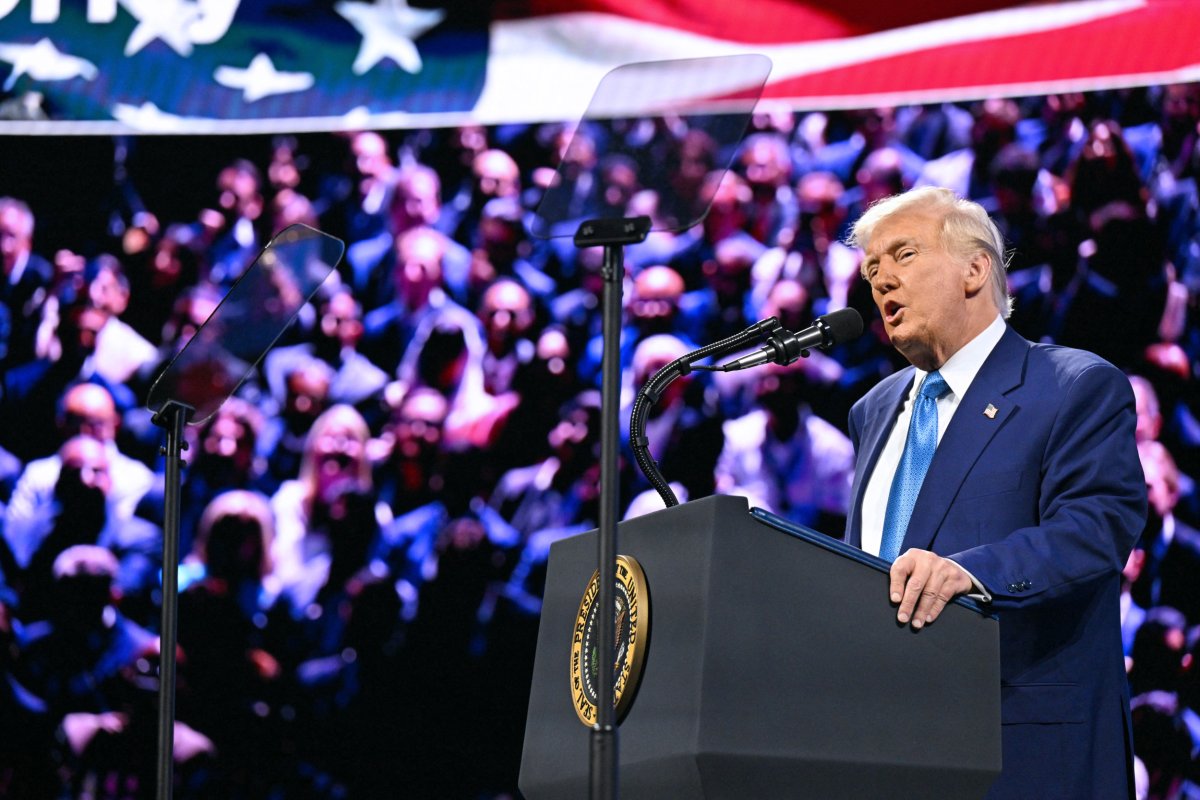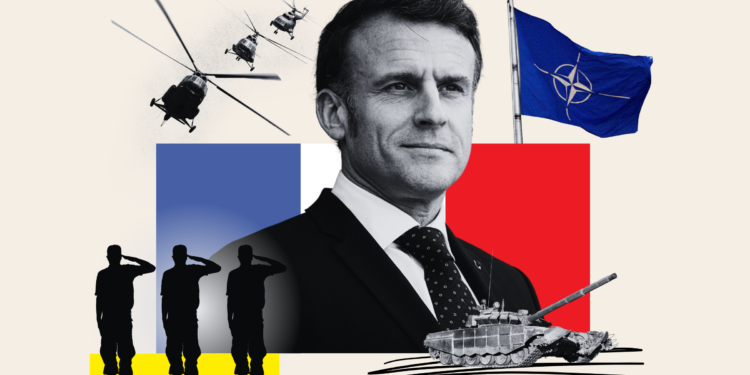A Russian “Grad” self-propelled multiple rocket launcher fires towards Ukrainian positions as a soldier gets ready to shoot drones in Ukraine in this photo published January 16.
A Russian “Grad” self-propelled multiple rocket launcher fires towards Ukrainian positions as a soldier gets ready to shoot drones in Ukraine in this photo published January 16.
Russian Foreign Ministry Press Service/AP
France has a history of diverging with NATO allies over concerns of U.S. dominance. In 1966, then-French President Charles de Gaulle unilaterally withdrew from NATO’s integrated command structure and expelled allied troops from its territory, citing frustrations over perceived unequal treatment. Paris only rejoined in 2009, six years after another spat with Washington over the U.S.-led invasion of Iraq.
While the U.S. maintains nuclear weapons across several European nations in line with the NATO nuclear sharing strategy, France is the only EU member state with its own strategic arsenal. The United Kingdom, which officially left the EU in 2020, also maintains its own nuclear capabilities.
Biscop described France and the U.K. as likely to constitute the “core group” of a more integrated, independent European military posture, both for their weapons of mass destruction as well as their “comprehensive strategic vision” on defense. Also key to this project, however, would be Poland, “which now has the largest armed force in Europe,” and Germany, for the “political weight” it holds, he said.
Today, all four nations, and many others in Europe, mutually view the war in Ukraine and the potential for further Russian operations as the most immediate threat to continental security. But there is another underlying concern fueled by the Trump administration’s embrace of right-wing, nationalist populist movements that have challenged the very idea of the EU.
Trump, Vance and Elon Musk, tech billionaire-turned-director of the new administration’s Department of Government Efficiency (DOGE) task force, have endorsed France’s National Rally and Germany’s Alternative for Deutschland (AfD). Both parties, considered by the leaderships of their respective countries to be far-right, have gained electoral ground in recent years, with the National Rally taking first place in France’s European Parliament elections last year and AfD poised for a major showing when Germany holds its federal election this weekend.
Vance, who met with AfD leadership in Munich, called for greater inclusivity in EU politics. The administration’s exposé of USAID programs has also sought to demonstrate the level of U.S. funding under past administrations toward promoting values aligned with the social democratic and liberal consensus among most EU states.
Biscop argued that a potential coalition between Trump’s ruling “Make America Great Again” movement and like-minded forces in Europe could further complicate efforts to establish a common outlook on military reform, among other initiatives.
“We have some extreme right parties already in government, and it makes it sometimes very difficult to reach consensus in the EU,” Biscop said. “I think there is a fear that if they will sort of coalesce around the Trump administration it will become even more difficult.”
“You get the distinct feeling that you have a president who is anti-EU, who is ideologically anti-EU,” he added. “If you study the history of strategy, ideology and strategy really don’t mix. So, if you let your ideology drive the substance of your strategy, it really doesn’t end very well. This could become quite problematic.”

President Donald Trump speaks at the FII PRIORITY Miami 2025 Summit (Future Investment Initiative) at the Faena Hotel & Forum in Miami Beach, Florida, on February 19.
President Donald Trump speaks at the FII PRIORITY Miami 2025 Summit (Future Investment Initiative) at the Faena Hotel & Forum in Miami Beach, Florida, on February 19.
ROBERTO SCHMIDT/AFP/Getty Images
The ideological fissures in Europe have already become in apparent, with leaders such as Italian Prime Minister Giorgia Meloni, Slovakian Prime Minister Robert Fico and Hungarian Prime Minister Viktor Orbán aligning themselves with some of the Trump administration’s talking points on Ukraine and European politics.
“Apart from the countries governed by the extreme right and extreme right-wing parties, the other countries were shocked by the comments made by the American leaders, President Donald Trump and his Vice-President J.D. Vance,” Jean-Pierre Maulny, deputy director of the French Institute for International and Strategic Affairs, told Newsweek, “both in terms of their attack against European democracies and the failure to recognize that Putin’s Russia had violated international law by attacking another country, leading to a reaction of support from Europeans for Ukraine in accordance with the United Nations Charter and Article 51 thereof.”
“Europeans are gradually becoming aware of their solitude,” Maulny, a leading security expert who previously served as adviser to the French National Assembly’s Defense and Armed Forces Committee, added.
Echoing Posen, Maulny noted that further rifts exist among nations debating how exactly to approach the problem, some driven by a desire to appease Trump and others believing it may already be too late for Europe to take charge of its own defense absent the U.S. guarantee.
“Some do not wish to displease Donald Trump for the moment, considering that the United States is a member of NATO, bound by Article 5 of the North Atlantic Treaty and its mutual assistance clause, and that we should not displease him either,” he said. “Others believe that it is too late, that a point of no return has been reached and that it is up to Europeans to take responsibility for their own security.”
“But whether you are in one camp or the other has no impact on the fact that both camps believe that Europeans should increase their defense budgets in order to face current European security challenges,” he said.
And even as European nations begin to ramp up defense spending and have just this year achieved their February 2023 goal of delivering a rate of million shells per year to Ukraine, larger questions surround what comes next for the transatlantic relationship long viewed as the cornerstone for European security.
“The real question is whether an agreement between the United States and Russia on Ukraine will be to the detriment of Europeans’ security interests, which is what we fear today,” Maulny said. “The other question is that of the future relationship between Europe and the United States: friend or enemy?”
Source link : http://www.bing.com/news/apiclick.aspx?ref=FexRss&aid=&tid=67b862974111401291bfd711c490a4ff&url=https%3A%2F%2Fwww.newsweek.com%2Fmacron-was-right-about-future-europes-security-it-too-late-2034039&c=4384196677244147404&mkt=de-de
Author :
Publish date : 2025-02-21 02:00:00
Copyright for syndicated content belongs to the linked Source.



